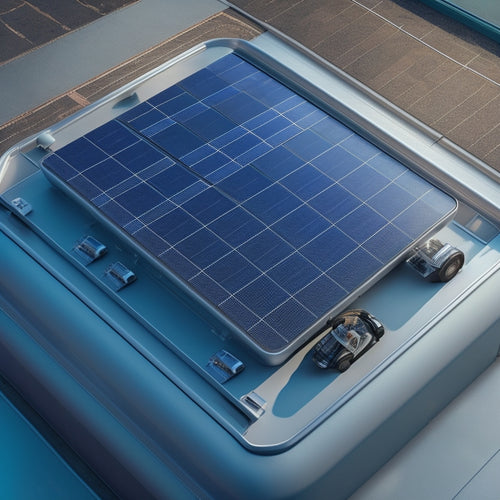
Essential Information on House Battery Storage Systems
Share
You're evaluating a house battery storage system to optimize your energy usage and costs. A house battery system stores excess energy from solar panels or the grid, enabling energy use at night or during outages. There are various battery storage options, including lithium-ion, lead-acid, and sodium-ion batteries, each with its own advantages and limitations. Choosing the right battery depends on your energy needs, budget, and compatibility with existing systems. By understanding the key benefits of home storage, such as energy independence and cost savings, you can make an informed decision. Now, let's examine the essential factors to assess when selecting and installing a house battery storage system that's right for you.
Key Takeaways
- House battery systems store excess energy from solar panels or the grid, enabling energy use at night or during outages.
- The right battery choice depends on capacity needs, chemistry type, depth of discharge, cycle life, and compatibility with existing systems.
- Installation costs vary from $5,000 to $15,000 or more, and regular maintenance is necessary to ensure optimal system performance.
- Energy efficiency impacts storage capability, reducing losses and enabling significant cost savings by offsetting peak hour consumption.
- Key benefits of home storage include energy independence, cost savings, and increased overall energy efficiency and sustainability.
What Is a House Battery System
A house battery system, also known as a home energy storage system, is a type of energy storage technology designed to store excess energy generated by your solar panels or grid for later use.
This system enables you to utilize and store energy during the day, when your solar panels are producing power, and use it at night or during power outages. The battery capacity of your system determines how much energy you can store, and a higher capacity means you can power more appliances or devices for a longer period.
When choosing a house battery system, you'll want to evaluate energy efficiency, as it directly affects how much power you can store and use.
A more efficient system reduces energy losses during charging and discharging, allowing you to maximize your energy storage. Additionally, an efficient system can help reduce your energy bills and carbon footprint.
Types of Battery Storage Options
Your house battery system's storage capacity depends on the type of battery storage option you choose, which can greatly impact your energy independence and savings. The right choice can guarantee you have a reliable backup power source during outages and maximize your energy savings.
When selecting a battery storage option, you have several types to evaluate:
-
Lithium Ion Batteries: Known for their high energy density, long lifespan, and low maintenance, lithium-ion batteries are a popular choice for home energy storage.
-
Lead Acid Options: A more affordable alternative to lithium-ion batteries, lead acid batteries are a reliable choice for short-term backup power and smaller energy storage needs.
-
Sodium-Ion Batteries: A newer alternative to lithium-ion batteries, sodium-ion batteries offer similar performance at a lower cost.
-
Flow Batteries: Ideal for long-duration energy storage, flow batteries are well-suited for off-grid systems and large-scale energy storage applications.
-
Nickel-Cadmium (Ni-Cd) Batteries: A mature technology, Ni-Cd batteries offer reliable performance and are often used in renewable energy systems.
Key Benefits of Home Storage
With the right battery storage option in place, you can access a multitude of benefits that enhance your energy independence and savings.
For instance, you'll have the ability to store excess energy generated by your solar panels or wind turbines during the day, and use it to power your home at night or during outages. This reduces your reliance on the grid, providing you with a sense of energy independence.
You'll also experience significant cost savings by reducing your energy bills. By storing excess energy, you can offset your peak hour consumption, minimizing the amount of energy you purchase from the grid.
Additionally, many utilities offer time-of-use pricing, where energy is cheaper during off-peak hours. With a home storage system, you can charge your batteries during these hours and use the stored energy during peak hours, further reducing your energy costs.
How to Choose the Right Battery
Selecting the ideal battery for your home storage system is crucial, as it directly impacts the overall performance, efficiency, and lifespan of your setup. When choosing a battery, you'll need to take into account several key factors to guarantee you get the right one for your needs.
Here are some key considerations to keep in mind:
-
Capacity considerations: Determine how much energy you need to store and how much you're willing to pay for it. A higher capacity battery will provide more power, but it will also increase the upfront cost.
-
Chemistry types: Decide between lead-acid, lithium-ion, or other chemistry types, each with their own advantages and disadvantages. Lithium-ion batteries, for example, offer high energy density and long lifetimes, but are more expensive.
-
Depth of discharge (DOD): Think about how deeply you can discharge the battery without affecting its lifespan. A higher DOD means you can use more of the battery's capacity, but may reduce its overall lifespan.
-
Cycle life: Consider how many charge and discharge cycles you need the battery to handle. A higher cycle life means the battery will last longer and provide more value over time.
-
Compatibility: Confirm the battery is compatible with your existing system and any future upgrades you may want to make.
Installation and Maintenance Tips
Proper installation and regular maintenance are critical to guaranteeing your house battery storage system operates safely and efficiently.
When installing your system, you'll need to take safety precautions seriously, such as making sure the battery is installed in a well-ventilated area and that all electrical connections are secure. You should also consider hiring a licensed electrician to handle the installation, as it can be complex and requires specialized knowledge.
Additionally, be prepared for installation costs, which can range from $5,000 to $15,000 or more, depending on the size and complexity of your system.
To maintain your system, you'll need to regularly check the battery's state of charge, voltage, and temperature.
You should also verify the system is clean and free of dust, as buildup can reduce efficiency.
Perform routine software updates to make certain your system is running with the latest features and optimization.
Frequently Asked Questions
Can House Battery Storage Systems Be Used for Off-Grid Living?
You can utilize house battery storage systems for off-grid living by utilizing off-grid energy through solar integration, enabling you to store excess energy generated during the day for nighttime use, achieving energy independence.
Are There Any Government Incentives for Home Battery Storage?
You'll be eligible for federal tax credits and state rebates when you install a home battery storage system, considerably reducing your upfront costs; research the specific incentives available in your area to maximize your savings.
Do Home Batteries Affect Property Resale Value?
As you plant a tree of energy efficiency in your backyard, its roots of property investment grow stronger, increasing your property's resale value, making your home a coveted gem that attracts power-savvy buyers.
Can I Use My Generator With a House Battery Storage System?
You can use your generator with a house battery storage system, ensuring generator compatibility, as it can charge your batteries, but you'll need to configure the system to prioritize battery charging from the generator during outages.
Are Home Battery Storage Systems Prone to Hacking?
Like a digital fortress, you'll want to safeguard your home battery storage system from cyber threats. Thankfully, most systems have strong cybersecurity measures in place to protect your data privacy, so you can rest easy knowing your energy independence is secure.
Related Posts
-

Solar Panel System Certification Costs: A 10-Point Breakdown
You're looking to understand the costs associated with solar panel system certification. Your total certification cos...
-

Top Solar Panels for Car Battery Maintenance
When selecting top solar panels for car battery maintenance, consider high-efficiency models with high wattage output...
-

Charging Station Incentives: Why So Many Are Free
You're likely to stumble upon free or low-cost charging stations due to a convergence of incentives. Government rebat...


